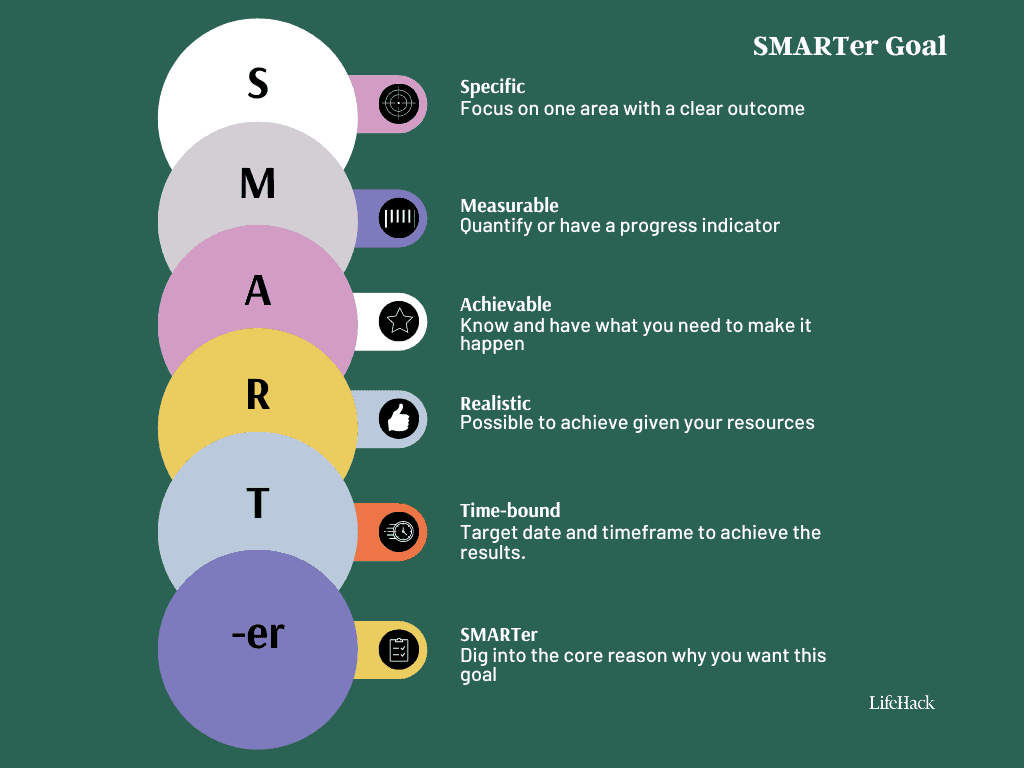In today’s world, goal setting is a concept that is constantly emphasized by motivational speakers, self-help books, and success stories of all kinds. Setting goals has become a go-to strategy for achieving one’s aspirations, from personal development to career advancement.
However, while we often hear about the importance of goal setting, it’s easy to wonder if it’s just a trendy buzzword or if it has real merit. Is it really necessary to have a goal in order to achieve what we want in life?
In this article, we’ll look at the science of goal setting and why it’s such an important part of achieving success. We’ll also look at some examples of how goal setting has been used to achieve outstanding results in a variety of areas of life.
Table of Contents
What Is Goal Setting?
Before you can understand goal setting, you must first understand goals and objectives.
A goal is essentially your long-term ambition; the main focus is the larger umbrella. Objectives, on the other hand, fall under the umbrella of goals; they are the stepping stones that will help you in reaching your objectives.
Goal setting is the process of defining objectives that an individual or organization sets out to achieve. It involves deciding what needs to be done and devising a strategy to accomplish it.
“Your goals are the roadmaps that guide you and show you what is possible for your life.” – Les Brown, American politician and motivational speaker
Goal setting typically entails breaking down a larger goal into smaller, more manageable objectives and outlining the steps required to achieve each of them. It also involves setting deadlines and developing metrics to track progress toward the goals.
Since setting goals necessitates having a clear understanding of what one wants to achieve and their priorities, it gives one a sense of purpose and direction, which can be a powerful motivator for keeping one’s attention on what is most important to them.
Furthermore, setting goals can be used to improve a variety of aspects of life, such as academic performance, career advancement, and personal growth. It provides a framework within which individuals can direct their efforts and resources to achieve their goals.
Why Is Goal Setting Important?
To grasp the significance of goal setting, consider how it can affect outcomes in these 4 ways:[1]
- Choice – Setting goals can influence outcomes by focusing your attention and efforts on goal-relevant activities while diverting attention away from goal-irrelevant actions. You become more selective in your actions, focusing on those that are most likely to help you achieve your goals.
- Effort – Goals can motivate you to work harder than you would otherwise. This increased effort may be due to a desire to achieve the desired outcome as well as the perceived value of accomplishing that goal.
- Persistence – Goals can also influence outcomes by increasing your willingness to persevere in the face of setbacks. When faced with obstacles, setbacks, or difficulties, having a specific goal in mind can help you stay motivated and persistent.
- Cognition – Setting a goal encourages people to reflect more deeply on their behavior, habits, and the actions needed to achieve the desired outcome. This can lead to behavioral changes, such as the adoption of new habits or routines that help in the achievement of the goal.
With these four outcomes in mind, let’s look at the benefits of goal setting in achieving desired results.
1. A Better Chance of Success
Goal setting helps you prioritize your actions and focus your efforts on what is most important by directing your attention away from goal-irrelevant activities and toward goal-relevant activities. This allows you to make better use of your time and resources, increasing your chances of success.
For example, if a person’s goal is to lose weight, they may focus on healthy eating and exercise while avoiding activities that may hinder their progress, such as eating high-calorie foods or having a sedentary behavior.
2. Increased Motivation and Performance
When we set goals for ourselves, we are committing to achieving specific outcomes by a specific deadline. This commitment can motivate us to act and hold ourselves accountable for our progress toward our objectives. We are more likely to engage in goals-congruent behaviors and avoid behaviors that are not aligned with our desired outcomes.
This can result in increased performance and achievement. In fact, according to studies, people perform better when they are committed to achieving specific goals.[2]
For instance, if a person’s goal is to run a marathon, they may put in more effort in training than if they did not have a specific goal in mind.
3. Building Resilience
Setting goals promotes perseverance by providing people with a sense of purpose and direction.
We can develop a plan of action, anticipate potential obstacles, and develop strategies to overcome them if we have a clear understanding of what we want to achieve. We are also more likely to seek out and leverage the resources and support we require to achieve our objectives, such as seeking advice from mentors or collaborating with others who share our objectives.
Setbacks and obstacles become opportunities for growth and learning when we have a clear sense of what we want to achieve, rather than sources of discouragement or frustration.
4. Promoting Growth and Development
Setting goals is essentially creating a road map for yourself to follow. As you work toward your goals, you may discover new perspectives and insights that can lead to personal growth and development.
If someone sets a goal of running a 10k race in six months, they may start by running a few kilometers at a time. They may discover that they are capable of accomplishing more than they previously thought possible as they progress and push themselves to run further.
Furthermore, the act of setting goals encourages people to reflect on their own strengths and weaknesses, identify areas for improvement, and take action to improve themselves. This process of self-reflection and self-improvement is critical for personal growth and development because it allows individuals to strive to be the best version of themselves at all times.
How to Set Goals Effectively
Now that you understand the importance of goal setting, the best way to reap those benefits is to set goals the right way.
1. Set a SMARTer Goal
When it comes to goal setting, you’ve probably heard of the SMART goal methodology. However, rather than simply setting a SMART goal, I teach people how to set a SMARTer goal.
In addition to a regular SMART (Specific, Measurable, Achievable, Realistic, Time-Bound) goal, a SMARTer goal is designed to help you understand what you truly want to achieve and why, in order to keep you motivated.
You can do this by delving deeply into your desires using the 5 Whys framework. The purpose of this framework is for you to ask yourself “why?” five times. Every time you ask why, you’re getting to the heart of why you started setting goals in the first place.
Let’s say your initial goal is to ‘get promoted.’
- Why do you want to get promoted?
“Because I want more responsibilities at work.” - Why is having more responsibility at work important to you?
“Because I want to feel like I’m contributing meaningfully to the company and have more say over important decisions.” - Why is making a meaningful contribution to the company and having more say over important decisions important to you?
“Because I want to feel like I’m making progress in my career and contributing to the company’s success.” - Why is it important for you to progress in your career and contribute to the company’s success?
“Because I want to feel fulfilled in my work and achieve financial stability for myself and my family.” - Why is feeling fulfilled in your work and achieving financial stability important to you?
“Because it will allow me to live a comfortable and secure life, while also providing for my family.”
Can you now see the difference between the initial want and the true purpose at the end? The ultimate purpose “to live a comfortable and secure life while also providing for my family” will be a stronger motivator to get through the tough times compared to “getting promoted.”
And now, the SMARTer goal is:
“I want to get promoted within the next year by taking on more responsibility and making meaningful contributions to the company’s success, in order to achieve financial stability for myself and my family and feel fulfilled in my work.
If you want to learn how to set long-term goals to achieve bigger success, I recommend you to read How to Set Long Term Goals to Achieve Big Things
2. Break Down Your Goal into Smaller Milestones
Breaking down your goals into short-term goals which are smaller, more manageable steps is a crucial step in setting goals effectively. This can help you stay motivated and avoid feeling overwhelmed.
Using the example of getting promoted, we can break it down into smaller steps such as:
- Meet with my supervisor to discuss potential areas of responsibility for the next 3 months.
- Successfully take on at least one additional area of responsibility within the next 6 months.
- Attend a professional development course or conference within the next 6 months to develop skills that will allow me to make meaningful contributions to the company’s success.
- Identify and successfully complete 1 project that has a measurable positive impact on the company’s success within the next 9 months.
- Seek out feedback from my supervisor and colleagues every other week to ensure that I am meeting or exceeding expectations in my new responsibilities.
- Successfully complete a performance review within the next 12 months that indicates I am ready for promotion.
You can focus on one step at a time if you break your goal down into smaller steps. This can help you stay motivated by allowing you to see progress with each step you take.
Breaking down your goals can also help you in identifying any obstacles or challenges that you may face along the way. This allows you to plan ahead and devise strategies to overcome these obstacles, allowing you to stay on track and achieve your goal.
3. Create an Action Plan
Once you’ve broken the goal down into milestones, you’ll need to create a detailed plan outlining the steps you’ll take to reach your goal. Here’s how it’s done:
- Establish timetables for each step: Each step in your plan of action should have its own timeline. This will facilitate you in staying on track and making progress toward your goal.
- Identify any resources or support required: This could include additional training, tools, or assistance from coworkers or mentors.
- Review and revise your plan regularly: This can help you in identifying any obstacles or challenges that may necessitate a change in strategy, ensuring that you’re on track and making progress.
Making an action plan can help you stay focused and motivated as you work toward your goal.
4. Track Your Progress
Tracking your progress allows you to see how far you’ve come and how close you are to reaching your goal. This can be extremely motivating, especially when you are experiencing difficulties or setbacks along the way.
Moreover, by tracking your progress, you can ensure that you are on track to meet your objectives. This can help you pinpoint any areas where you may be falling behind or not making enough progress, and you can then adjust your approach accordingly.
Depending on the nature of your goal, there are numerous ways to track your progress. For example, you could track your progress with a spreadsheet or goal tracking app, or you could use a fitness tracker to track your progress toward a fitness goal. The key is to find a method that works for you and stick to it.
How to Achieve Your Goals
While setting goals is important, the real magic happens when you act on those goals and make progress toward them. To reach your goals, you must stick to your plan and take consistent action.
Check out The Ultimate Guide to Goal Achieving & Goal Setting to learn more about how to achieve your goals and live a fulfilling life. It offers practical advice for staying motivated and overcoming obstacles, as well as actionable tips and strategies for achieving your goals.
Final Thoughts
Setting goals is essential for personal and professional development because it allows us to clarify our priorities, focus our efforts, and progress toward the life we want to live.
Setting a SMARTer goal allows us to have something specific to aim for, so we know how to progress towards it. Whether for financial stability, career advancement, or improving your health and relationships, setting goals is the first step toward making your dreams a reality.
Setting a SMARTer goal gives us something specific to aim for, so we know how to get there. Whether for financial stability, career advancement, or bettering your health and relationships, setting goals is the first step toward making your dreams a reality.
So, don’t wait any longer; start setting goals today. It is never too late to start working toward the life you truly desire.
Featured photo credit: Unsplash via unsplash.com
Reference
| [1] | ^ | American Psychological Association: The Study of Work Motivation in the 20th Century. |
| [2] | ^ | American Psychologist: Building a practically useful theory of goal setting and task motivation – A 35-year odyssey |



































